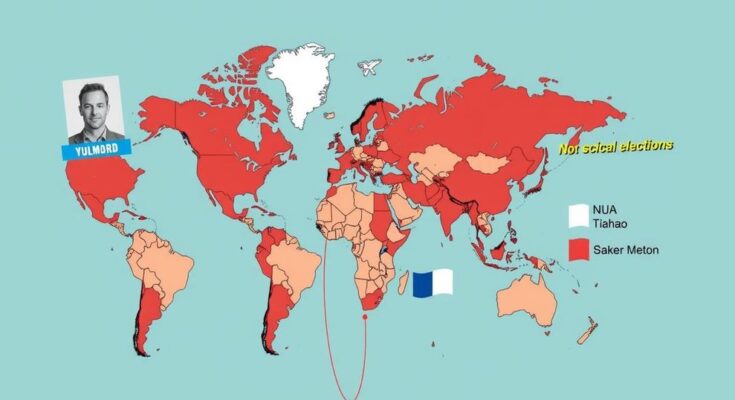In 2024, elections across 70 countries led to widespread incumbent ousting due to voter dissatisfaction with economic turmoil and instability, resulting in a significant rise of far-right populism and the emergence of outsider candidates. Major electoral shifts were observed in countries like India, the U.S., and South Africa, alongside rising concerns over election integrity and foreign influence. Looking forward, challenges to democratic governance are expected to continue, with potential instability in major powers looming on the horizon.
As the year 2024 draws to a close, global elections across 70 countries have illustrated a potent discontent among voters, leading to the widespread ousting of incumbents. Voters expressed their frustrations through significant electoral shifts in nations such as India, the United States, and various European countries. Driven by prolonged economic struggles and disillusionment with established leadership, anti-incumbent sentiment dominated the political landscape, resulting in the rise of outsider candidates and a marked increase in far-right populism. In regions like South Africa, Kenya, and Japan, incumbent parties have experienced substantial losses, compelling them to forge unexpected coalitions in response to voter demands for change. Furthermore, accusations of electoral interference and pervasive disinformation emerged as critical concerns, complicating the already turbulent political environment, as highlighted by the challenges faced by several nations, including Romania and Georgia, in attempting to ensure fair election practices.
The elections of 2024 have characterized a pronounced undercurrent of frustration amongst global electorates. Amidst the fallout from geopolitical disturbances such as the ongoing conflict in Ukraine, high inflation has further exacerbated public dissatisfaction. Many incumbents, including South Africa’s ANC, which suffered significant losses after years of governance, faced electoral retribution due in part to high unemployment and deepening social inequalities. Notably, Prime Minister Narendra Modi’s party in India suffered an unprecedented parliamentary loss, resulting in a coalition government for the first time in a decade.
What stands out is the surge of opposition figures and parties gaining traction in markets long dominated by established interests. For instance, in the United Kingdom, the Conservative Party was resoundingly defeated by Labour, indicating a shift in voter preferences toward center-left policies. However, this also reflects a fragmentation of support that paved the way for extreme right parties to gain a foothold, complicating the political dynamics in numerous established democracies. Similarly, discontent with the long-standing leadership in countries like Sri Lanka led to significant political upheaval, with calls for reform echoing throughout various regions.
Amplifying these challenges are concerns over electoral integrity, with growing incidents of covert manipulation and disinformation campaigns reported worldwide. Platforms such as Meta disclosed having dismantled numerous election-related influence operations, predominantly linked to foreign interference. The implications of these activities, particularly those involving Russian entities, have raised alarms about the viability of democratic processes in several countries, evidencing a rising global trend that merits close scrutiny as the political climate continues to evolve.
Amidst the anticipated continuation of this trend into 2025, several incumbents across major democracies are under pressure as dissatisfaction with the status quo intensifies. Countries including Germany and Canada confront impending elections, exacerbated by unpopularity among ruling parties, which may lead to further disruptions and shifts in the political framework. The central question remains: will the dissatisfaction resonate with democratic principles that citizens espouse or will it culminate in an environment conducive to authoritarianism and political instability?
The year 2024 was marked by global upheaval as major elections occurred across nearly 70 countries, highlighting a rising tide of anti-incumbent sentiment fueled by economic discontent and societal unrest. The lingering effects of the COVID-19 pandemic, exacerbated by geopolitical tensions, particularly the Russia-Ukraine war, have intensified voter dissatisfaction. This political phenomenon saw voters across major democracies expressing their discontent through significant electoral changes, often favoring disruptive candidates from outside the traditional political framework. As many incumbents faced decisive losses or were compelled into coalition governments, the year also revealed alarming trends in electoral interference and a growing skepticism towards the ability of established democracies to serve their citizens effectively.
In summary, the year 2024 vividly illustrates the fragility of democratic institutions in the face of public discontent. As incumbent leaders were largely rebuffed in favor of new, often more radical alternatives, the electoral landscape has shifted towards an unpredictable future. The pervasive issues of disinformation and electoral manipulation underscore the significant challenges facing democracies worldwide. Looking ahead, the inherent tensions between public expectations and political realities will likely shape the landscape of upcoming elections, prompting a reevaluation of how democracy is perceived and practiced globally.
Original Source: www.news4jax.com




